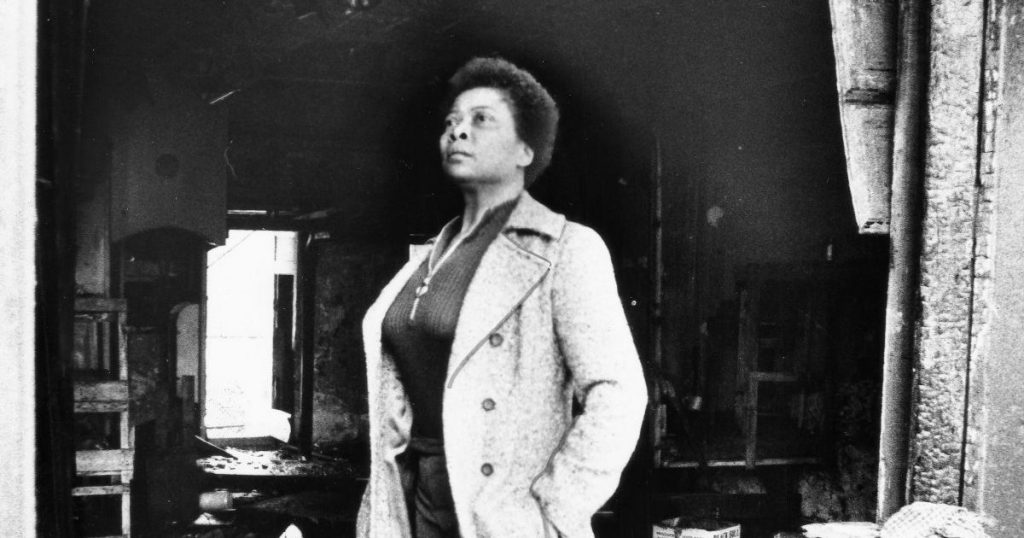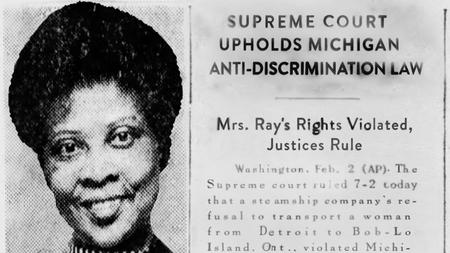Preserving the Legacy of Sarah Elizabeth Ray, Who Paved the Way for Desegregation in Detroit, U.S.
Filmmaker Aaron Schillinger and author Desiree Cooper bring attention to the story of Detroiter Sarah Elizabeth Ray, a Black woman who filed a complaint after being forcibly removed from the Boblo Boat in the 1940s.

Sarah E. Ray
In their 2020 documentary titled “Sarah Elizabeth Ray: Detroit’s Other Rosa Parks,” Desiree Cooper and Aaron Schillinger tell the story of Sarah Elizabeth Ray, a Black woman in Detroit who, in the 1940s, was forcibly removed from the city’s beloved Boblo Boat. Ray filed a complaint with the Detroit NAACP, and eventually her case made it to the United States Supreme Court, who affirmed she had a right to ride the Boblo ferry. Ray’s actions paved the way for desegregation efforts in Detroit and the United States. Now, Schillinger and Cooper are hoping to preserve Ray’s legacy by designating her abandoned home as a historic site with The National Trust.
“Just a couple years before … there was a riot on Belle Isle — a race riot … There was a push for leisure places to be open to people of all races, that was part of a movement. Sarah [Ray] moved the marker forward significantly in that regard.” –Desiree Cooper, author, producer and journalist
Listen: Filmmaker Aaron Schillinger and author Desiree Cooper discuss the legacy of Sarah Elizabeth Ray.
Guests
Desiree Cooper is an author, producer and journalist. Cooper notes that many Detroiters have never heard of Ray’s infamous ride on the Boblo boat. “I’m amazed because Detroiters of a certain age all have such fond memories of going on the Boblo Boat. It defined summer for Black and whites alike,” Cooper says. “It didn’t seem to hang on to that tarnished reputation of being a racist company.”

Though her legacy has been neglected, Ray’s actions paved the way for desegregation efforts in the following decades. “Just a couple years before … there was a riot on Belle Isle — a race riot … There was a push for leisure places to be open to people of all races. That was part of a movement. Sarah [Ray] moved the marker forward significantly in that regard.”
Cooper had the opportunity to visit Ray before her death in 2006. Cooper says, “It felt like she was very much forgotten … it was enormously sad for me to find one of our seniors in that state, especially one that had done so much for Detroit and the United States.”
Aaron Schillinger is a Detroit filmmaker. Schillinger discovered Ray’s story through his work with the SS Columbia Project, a nonprofit organization that owns the Boblo ferry that Ray was forcibly removed from in 1945. “I read a blurb in a history book written by Patrick Livingston called ‘Summer Dreams’ about Sarah Elizabeth Ray’s story and I just wanted to know more,” he says.
Schillinger explains that, following the desegregation of the Boblo Island boats, Ray “had this whole other life after that. She got married to a Jewish labor activist. After the rebellion of 1967 in Detroit … they created the Action House … in 1968,” says Schillinger. “It seems like all the kids who went to Action House … didn’t know anything about Sarah Elizabeth Ray … they just knew Liz Haskell, the woman who talked to them after school, helped them with their homework, kept them out of trouble.”
Cooper and Schillinger are trying to preserve Ray’s abandoned home on Detroit’s east side. Schillinger says, “There are poems, photographs … and you can see some of her late husband’s papers, as well as communist books. How great would it be to approach this as an archeological site?”
Trusted, accurate, up-to-date
WDET is here to keep you informed on essential information, news and resources related to COVID-19.
This is a stressful, insecure time for many. So it’s more important than ever for you, our listeners and readers, who are able to donate to keep supporting WDET’s mission. Please make a gift today.
